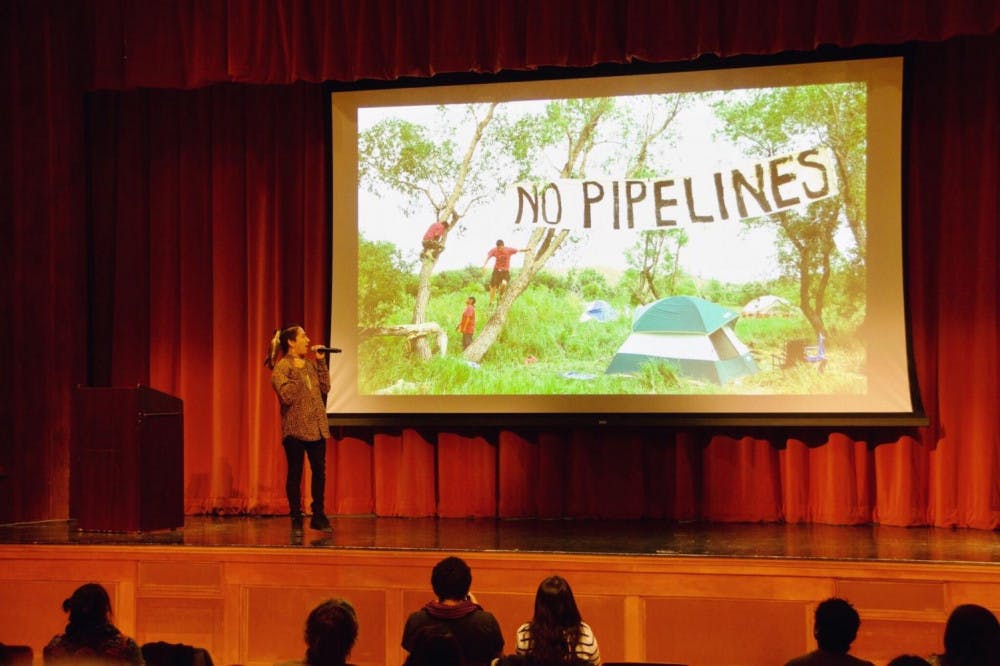Sunday Night Environmental Group (SNEG) and other environmental justice groups celebrated the college’s decision to adopt Energy2028 and divest from fossil fuels last month. This past weekend, the group held a symposium to examine the issues of justice, diversity and inclusivity that are pervasive within such environmental justice movements.
In a series of events on Friday and Saturday, the symposium organizers, speakers and performers sought to expose students to the various power dynamics involved in environmental justice and opened the floor for them to share their own feelings on the issue, both through open discussion and artistic performances.
The first of its kind, the symposium was organized by members of SNEG, including Sidra Pierson ’21 and Divya Gudur ’21, as well as other students. Their goal was to create a forum to confront the lack of diversity and inclusivity in environmental spaces.
“We hope that environmental activism can be used as a bridge to discuss the more nuanced, systemic marginalization that creates exclusive environmental narratives,” Pierson said.
The symposium kicked off Friday evening with a presentation by Thomas Tonatiuh Lopez Jr., a member of the Apache people and the communications director for the International Indigenous Youth Council (IIYC). His talk, titled “Birth of a Water Protector,” focused on his experiences protesting the construction of the Dakota Access Pipeline.
In 2016, Lopez Jr. quit his job and heeded the call of indigenous youths to join the protests. What was supposed to be a weekend trip to North Dakota turned into a three-week stay and led to Lopez Jr.’s membership in the IIYC.
“It was the first time in my entire life that I found myself surrounded by people exactly like me,” he said.
Though the pipeline protests were grounded in unity, there were also many incidences of confrontation. Only one day after protesters had a violent encounter with the national guard, Lopez Jr. was singled out for arrest at a protest in town.
Lopez Jr., who was the only person of color in the group, said police kicked him to the ground in the middle of a prayer, pointed their guns at his head and dared him to “resist.” Lopez Jr. finished the prayer and was promptly taken to jail, while the rest of the group received no punishment. He said the event was a pivotal moment in which he found his voice.
The symposium continued on Saturday with a panel on the intersections of food and environmental justice. Featured panelists included Lily Bradburn, the local food access coordinator at Helping Overcome Poverty’s Effects (HOPE), Professor of Food Studies Molly Anderson, Assistant Professor of Environmental studies Dan Suarez and Visiting Assistant Professor of History Lana Povitz, who specializes in food activism.
[gallery size="medium" ids="43611,43612,43614"]
“The same people who are affected by hunger are the same people who are poor, are the same people who are having to drink toxic water,” Povitz said.
Panelists also spoke of the hierarchies present within the system of food production, noting that those who produce food are also those in the most dire situations. In rural Addison County, migrant workers, for example, not only struggle to find affordable housing, but also have difficulty accessing transportation to get to work each day. Additionally, the stress from a low-wage, high-stress job like food production can often lead to sickness, resulting in medical expenses that many migrants cannot afford.
Jonathan Rosenthal, who co-founded the fair-trade companies Equal Exchange and Oké USA, spoke after the panel. Rosenthal urged students to become comfortable with being uncomfortable and walked students through his career journey, which began with his decision to drop out of college to pursue activism. He started Equal Exchange with the goal of paying farmers as high a price as possible for their products.
Despite skepticism about Equal Exchange’s business model from those around him, Rosenthal persisted.
“We had the audacity and arrogance to say that we’re not crazy, our society is crazy,” he said.
Students and professors then engaged in an open discussion about finding courage to believe in change and fostering change on the Middlebury campus.
The rest of the afternoon’s events included a talk on inclusivity and justice in the outdoors, a conversation on conservation and displacement and a workshop on making Middlebury’s environmentalism inclusive.
The last event of the Symposium took place in Crossroads Café, where, through dance, poetry, music and art, students expressed what environmental justice meant to them. Artist Kim Aranda ’22 displayed her paintings around the room, which touched on issues of air and water pollution, oil drilling and environmental racism.
Onstage performances included an a capella rendition of “The Lion Sleeps Tonight” by Ingoma and original poetry readings by Gudur and González. Students from Riddim performed a dance piece alongside an original poem read aloud by Hawa Adam ’22, titled “An Open Letter to Nature Poems.”
“You want to talk about nature? Well, let’s talk about how the barren trees are a means of oppression and code of depression,” she read.
Students Talk Inclusivity, Environment at Symposium

Comments



